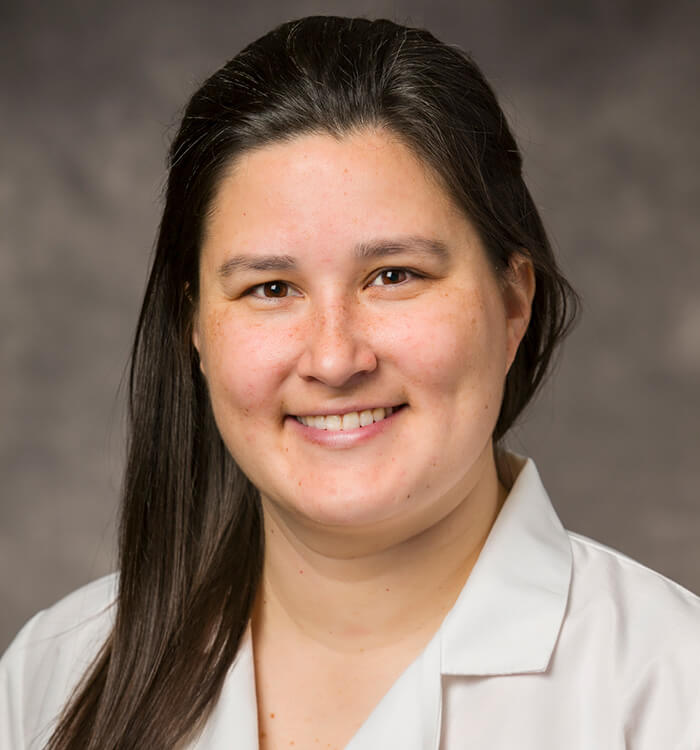UH Rainbow Babies & Children’s Hospital Conducts First-Ever Stem Cell Trial in Cystic Fibrosis
February 26, 2023

Pilot shows therapy is safe and well-tolerated
Innovations in Pediatrics | Winter 2023
A team led by University Hospitals Rainbow Babies & Children’s Hospital has conducted the first-ever clinical trial of human mesenchymal stem cells (hMSCs) as a potential treatment for people with cystic fibrosis (CF).
The Phase 1 trial, funded by the Cystic Fibrosis Foundation and recently published in the Journal of Cystic Fibrosis, established that a single, allogeneic intravenous infusion of hMSCs was safe and well-tolerated in 15 adult CF patients.
 Erica Roesch,MD
Erica Roesch,MDErica Roesch, MD, Director of the LeRoy W Matthews, MD, Cystic Fibrosis Center at UH Rainbow and Director of the Pediatric Cystic Fibrosis Clinical Care Center, is first author of the recent paper. She says she’s encouraged by the results of this pilot study.
“No dose-limiting toxicities, deaths or life-threatening adverse events were observed,” she says. “Most adverse events and serious adverse events were consistent with underlying CF. Vital signs, physical exam findings, spirometry and safety laboratory results showed no significant change from baseline.”
Widening Treatment Choices
Dr. Roesch says the current state of CF therapies makes looking at hMSCs a good option. Recently, new medications called CFTR modulators have become available for people with CF. These modulators are designed to correct the malfunctioning protein that causes people to have CF. Although CFTR modulators have had a positive effect on outcomes for people with CF, not all patients qualify for this treatment, she says.
“They’re available today for people ages 6 and up with certain mutations,” she says. “That includes about 90 percent of people with CF. However, there are some people who are unable to tolerate them. Human MSCs, on the other hand, are mutation-agnostic as a therapeutic and have the potential to help people who do not qualify for, do not tolerate or do not respond to highly effective modulator therapy.”
Plus, Dr. Roesch says, there’s still some question whether CFTR modulators can successfully manage all aspects of CF.
“The modulators have created great improvements in lung function and weight gain,” she says. “But there's still some unanswered questions, including what impact they're going to have on infection and inflammation, with some studies showing some evidence of ongoing inflammation, even in the setting of modulator therapy.”
Science Behind the Trial
In launching this clinical trial at UH Rainbow, Dr. Roesch collaborated closely with Tracey Bonfield, PhD, from the National Center for Regenerative Medicine at Case Western Reserve University. Dr. Bonfield’s research provides much of the pre-clinical foundation on which the trial is based. Her lab has shown that hMSCs have antimicrobial and anti-inflammatory potential both in vitro and in vivo. In addition, Dr. Bonfield and her colleagues have shown that treatment with hMSCs improves the effectiveness of antibiotics, reducing the dose necessary to eradicate bacteria.
“It was a great partnership between Case Western Reserve and UH Rainbow, collaborating to do translational research in CF, which is so important,” Dr. Roesch says. “We know that data from pre-clinical studies suggest that allogeneic bone marrow-derived hMSCs may provide a new therapeutic treatment for CF lung disease by attenuating pulmonary inflammation while decreasing bacterial growth and enhancing antibiotic efficacy.”
Next Steps
Dr. Roesch says she and her colleagues are currently in the initial phase of seeking funding for a larger trial of hMSCs in CF patients. Questions of efficacy remain unanswered by this first, small pilot, she says.
“The clinical trial was not powered to detect changes in exploratory measures, thus limiting our understanding of the impact of hMSCs on inflammation in CF,” she says. “The minimal effective cell dose and duration of treatment required to have a clinical effect remains unclear. Studies have shown hMSCs are typically cleared within 24 to 48 hours; however, the duration of their immunomodulatory impact is less clear as it can vary based on individual subject and disease characteristics. We hope to answer some of these questions and further evaluate hMSCs in larger, longer multicenter studies to determine if they reduce inflammation and attenuate infection in individuals with CF and ultimately improve lung function and quality of life.”
Contributing Expert:
Erica Roesch, MD
Director, LeRoy W Matthews, MD, Cystic Fibrosis Center, and
Director, Pediatric Cystic Fibrosis Clinical Care Center
UH Rainbow Babies & Children’s Hospital
Assistant Professor of Pediatrics
Case Western Reserve University School of Medicine


